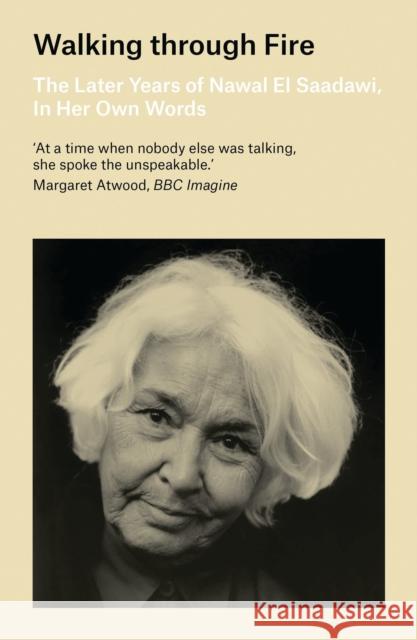Walking through Fire: The Later Years of Nawal El Saadawi, In Her Own Words » książka



Walking through Fire: The Later Years of Nawal El Saadawi, In Her Own Words
ISBN-13: 9781786993106 / Angielski / Miękka / 2018 / 304 str.
Walking through Fire: The Later Years of Nawal El Saadawi, In Her Own Words
ISBN-13: 9781786993106 / Angielski / Miękka / 2018 / 304 str.
(netto: 59,23 VAT: 5%)
Najniższa cena z 30 dni: 60,40 zł
ok. 22 dni roboczych.
Darmowa dostawa!
Beautifully repackaged, volume two of the autobiography of Nawal El Saadawi, the Arab world's leading feminist.
'Stormy and vivid, characterized by great intellectual and emotional restlessness ... It seems certain that without powerful self-belief and faith in her own instincts, she would not have survived.'
Times Literary Supplement
'I think her life has been one long death threat. At a time when nobody else was talking, she spoke the unspeakable.'
Margaret Atwood, BBC Imagine
'This is what great art does. It closes the great chasms between us. With words, Saadawi peels away the artifice to reveal the beating heart beneath the surface. We come away from this book as we do from all her others, amazed at her cool courage, profound insight, and deep passion. Without her brave work an entire country would not be fully known.'
Rebecca Walker
'A moving repudiation of those who have made Egypt's history in the last century'
Washington Post Book World
'El Saadawi's poetic prose and searing details keep the pages alive with stories of triumph, dissent, death and disappointment'
San Francisco Chronicle
'Her honesty, strength, courage, and accomplishments are admirable and inspiring'
Library Journal
1. The Threat 2. Spreading My Wings 3. The Village Doctor 4. The Tripartite Invasion 5. What is Suppressed Always Comes Back 6. Love and Despair 7. My Mother has no Place in Paradise 8. Moments that Belong Nowhere 9. The Death Threat 10. Beyond Consciousness 11. The Photograph 12. The Scalpel and the Law 13. The Defeat 14. Searching for Love 15. An Aborted Revolution 16. The Dream of Flying Index
El Saadawi, Nawal Nawal El Saadawi is an internationally renowned writer, novelist and fighter for women's rights both within Egypt and abroad.Born in 1931, in a village outside Cairo, she wrote her first novel, Diary of a Child Called Souad, at the age of thirteen. Unusually, she and her brothers and sisters were educated together. After graduating from the University of Cairo Medical School in 1955, specializing in psychiatry, she practised as a medical doctor for two years.From 1963 until 1972, Saadawi worked for the Egyptian government as Director General for Public Health Education. During this time, she studied at Columbia University in New York, where she received her Master's degree in Public Health in 1966. In 1972, however, she lost her job in the government as a result of political pressure. The magazine Health, which she founded and had edited for more than three years, was closed down.From 1973 to 1978 Saadawi worked at the High Institute of Literature and Science. It was at this time that she began to write, in works of fiction and non-fiction, the books on the oppression of Arab women for which she has become famous. Her most renowned novel, Woman at Point Zero, was published in Beirut in 1973. It was followed in 1976 by God Dies by the Nile and in 1977 by her study of Arab women, The Hidden Face of Eve.In 1981 Nawal El Saadawi publicly criticized the one-party rule of President Anwar Sadat, and was subsequently arrested and imprisoned. She was released one month after Sadat's assassination. In 1982, she established the Arab Women's Solidarity Association, which was outlawed in 1991. For some years during the Mubarak regime, Saadawi lived in exile, teaching in universities in the USA and Europe, including Duke University and Washington State University. Saadawi returned to Egypt in 1996. In 2004 she presented herself as a candidate for the presidential elections in Egypt, with a platform of human rights, democracy and greater freedom for women. In July 2005, however, she was forced to withdraw her candidacy in the face of ongoing government persecution.Nawal El Saadawi has achieved widespread international recognition for her work. She holds honorary doctorates from, among others, the universities of York, Illinois at Chicago, St Andrews and Tromso as well as Universidad Nacional Autónoma de México. Her many prizes and awards include the Premi Internacional Catalunya in 2003, the Council of Europe North-South Prize in 2004, the Women of the Year Award (UK) in 2011, the Sean MacBride Peace Prize (Ireland) in 2012, and the French National Order of Merit in 2013. Her books have been translated into over forty languages worldwide. They are taught in universities across the world. Hetata, Sherif Sherif Hetata, the author, was first arrested when, on completion of his medical studies in the mid-forties, he became involved in the turbulent politics of post-war Egypt. In 1950 he escaped from prison and fled to Paris, where he spent a brief year of freedom. Returning secretly to Egypt, he was eventually caught and sentences to ten years' penal servitude. Two of these were spent in iron shackles working in a stone quarry. On his release in 1966 he worked first in the Ministry of Health - where he met and married the feminist and writer Nawal El Saadawi - and then for the United Nations. In 1980 he gave up his job to devote himself to writing. His earlier novel, The Eye with an Iron Lid, was first published in English in 1982.
1997-2024 DolnySlask.com Agencja Internetowa
KrainaKsiazek.PL - Księgarnia Internetowa









